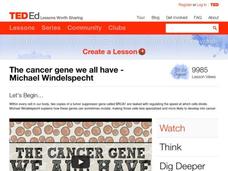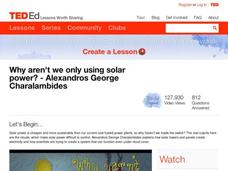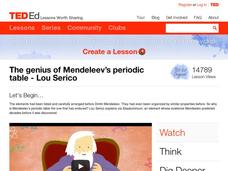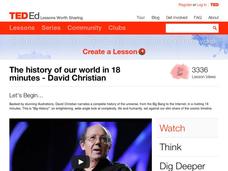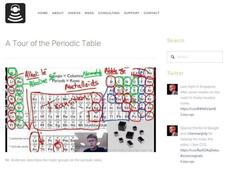TED-Ed
An Athlete Uses Physics to Shatter World Records
Have you heard of the Fosbury Flop? It was invented by a college high jumper in and has become the standard technique for high jumpers world wide. Learn the physics of this move and why it is more effective for clearing the bar than the...
TED-Ed
Poison vs. Venom: What's the Difference?
Did you know that poison and venom are not the same? Both are toxic, but poison must be inhaled, ingested, or absorbed, while venom must be injected into a wound. The narrator explains that some toxic compounds may be used for good, as...
TED-Ed
The Case of the Vanishing Honeybees
It's time for CSI: Honeybees! The numbers of domesticated honeybees in the US have been diminishing at an astounding rate, and investigators are out to find out why. The included video features three possible explanations and illuminates...
TED-Ed
Dead Stuff: The Secret Ingredient in Our Food Chain
A disgusting and direct description of detritus and decomposition is digested in this drill! Your life science class learns about the importance of decomposers in the food chain and finds out how one organism's trash is another...
TED-Ed
The Fundamentals of Space-Time: Part 3
If you weren't already blown away by first two installments, check out this clip on how gravity and space-time interact! Our physicist friends, Pontzen and Whyntie, continue their discussion of these motion concepts for your high...
TED-Ed
The Cancer Gene We All Have
What is cancer? And why don't we all have it? These concepts are explored and tumor suppressor genes are introduced in this animated feature. This nutshell of information is fully packed and makes an outstanding resource for your biology...
TED-Ed
How Whales Breathe, Communicate... and Fart with Their Faces
Dr. Joy Reidenberg is an expert in comparative anatomy, but also quite relatable to preteens! Here, she lectures on echolocation by likening it to "farting with the face!" She explains with film, actual whale voice recordings, diagrams,...
TED-Ed
Why is Ketchup so Hard to Pour?
Shake and shake the ketchup bottle, none will come, and then a lot will pour out! Finally, a scientific answer to the age-old question of why it is nearly impossible to get this coveted condiment out and onto your french fries! Along the...
TED-Ed
Why Aren't We Only Using Solar Power?
Drive the clouds away from your day with this video. It thoroughly details how photovoltaics work and how clouds prevent us from relying solely on solar as an energy source. Unique knitted-object animation (bunnies, clouds, and all other...
Nemours KidsHealth
How the Body Works: Bones
Coming soon: A full-length video about bones. Don't disregard this in the meantime, however. It's a valuable introduction that you could insert into your lesson about the skeletal system. With a silly Texas accent, the narrator covers...
Curated OER
The ABC's of Gas: Avogadro, Boyle, Charles
Using chalkboard animation, this video thoroughly explains the three empirical gas laws: Avogadro's, Boyle's, and Charles'. Use it as an introduction when teaching young chemists about the properties and behavior of gases.
TED-Ed
The Genius of Mendeleev's Periodic Table
The author-narrator refers to the periodic table of elements as a "massive slab of human genius," then goes on to explain Mendeleev's development of this foundational chemistry tool. Why was his version so much better than others that...
TED-Ed
The History of Our World in 18 Minutes
A fascinating lecture on history by David Christian, who is known for an interdisciplinary approach called Big History. His talk is enhanced by computer graphics and diagrams, but holds its own simply by its span of disciplines. Hear...
PB Works
Film Viewing Guide for the movie “Glory” (1998)
Check out this simple, ready-to-use learning exercise that your young historians can complete as they watch the motion picture Glory. It begins with a very brief list of characters to track, followed by seven short-answer questions to be...
Lehigh University
Glory (1989) - Should it be Shown in Class?
This is a fantastic activity that prompts learners to think like educators and consider the value of a historically based film beyond just the accuracy of information. Your young historians will work in groups to do a close reading and...
pelinks4u
Volleyball
Before coaching or beginning your next PE unit on volleyball, take a look at this 30-lesson unit that offers instructional techniques for each lesson, as well as warm-up activities, set inductions, and suggested coaching refinements.
Crash Course Kids
Here Comes the Sun
Get to know Sol with this fast paced, kid-friendly video featuring the closest star to Earth, the sun. Super scientists take part in a quick pop quiz, then learn all about Sol's size, distance, and how it creates and sends energy to Earth.
Calculus Expert
Sketch the Graph of a Parabola
How many ways can you graph a quadratic? The video shows two approaches to graphing a quadratic expression that is initially in standard form. The first method finds the vertex using -b/2a. The second approach is to find (h,k).
Bozeman Science
A Tour of the Periodic Table
The major groups on the periodic table and their general properties based on their electrons are the focus of a video that also explains why the table is drawn in two parts and which elements are crucial to life.
Crash Course
Dark Energy, Cosmology Part 2
What's driving the expansion of the universe, and will it ever stop? Take a trip to the dark side in a video full of surprising facts and twists about our view of what lies beyond. Junior cosmologists learn about the invisible energy of...
PBS
Seasonal Science: Pine Pollen
More than 125 species of pine trees exist, and each species can live over 100 years, with some living over 1,000 years—that's a lot of pine pollen! The Seasonal Science series explains why pine trees produce pollen. The video details the...
Crash Course
Moonlight
The Academy of Motion Pictures Arts and Sciences awarded its 2017 Best Picture award to Moonlight, which was written and directed by Barry Jenkins. The tender exploration of expectations for black men, contrasted with the reality of...
Corbett Maths
Adding Algebraic Fractions
The process requires the combination of several concepts. A video shows how individuals need several concepts to add rational expressions. Pupils must remember they need to find common denominators, combine like terms, and use the...
C-SPAN
On This Day: The Monroe Doctrine
The Monroe Doctrine is one of the longest-lasting presidential policies, and it still impacts foreign policy today. Using three clips from historians and archivists, scholars explore the world of James Monroe and his watershed statement....
Other popular searches
- Editing Paragraphs
- Revising and Editing
- Peer Editing
- Paragraph Editing Practice
- Proofreading and Editing
- Photo Editing
- Editing Checklist
- Editing Marks
- Paragraph Editing
- Peer Editing Checklist
- Peer Review
- Self Editing







